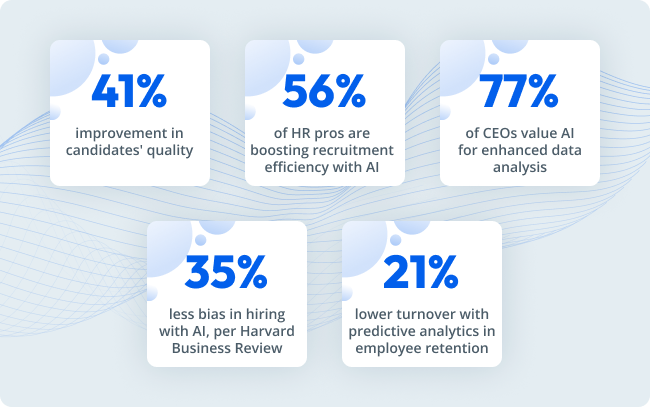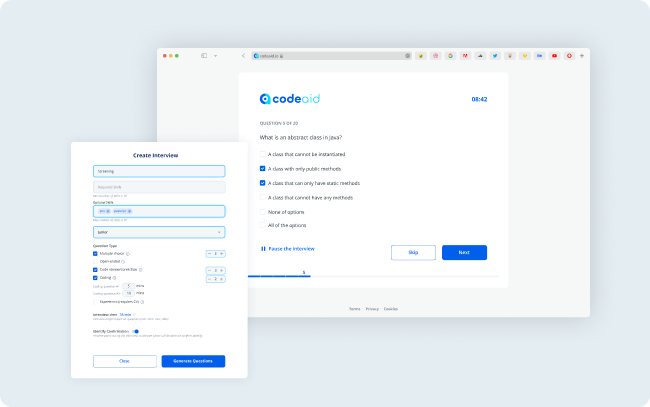Integrating AI Tools in your existing HR workflows
Would you want to save 75% of the time you put into initial screenings during recruitment?
Read MoreWhat Is AI Interview? In a world where scheduling interviews, crafting questions, and evaluating answers consume time and resources, many companies are turning to AI interviewers to streamline the process. This is particularly evident for technical roles, where a shortage of technical staff for interviews or an overwhelmed existing technical team necessitates the need for […]

In a world where scheduling interviews, crafting questions, and evaluating answers consume time and resources, many companies are turning to AI interviewers to streamline the process. This is particularly evident for technical roles, where a shortage of technical staff for interviews or an overwhelmed existing technical team necessitates the need for efficient solutions.
To briefly address the question ‘What is an AI interview?’— an AI interview is a cutting-edge approach that leverages artificial intelligence to streamline and enhance the screening and evaluation of candidates in the hiring process.
With more than 86% of employers embracing AI to curate the initial stages of interviews, this trend is rapidly reshaping how hiring is approached. Unlike traditional interviews, which are often time-consuming and resource-intensive, AI interviews introduce efficiency and objectivity, revolutionizing how companies identify top talent.
AI interview screening, powered by artificial intelligence, streamlines the recruitment process from start to finish.
AI interview tools can do all of this because they leverage Large Language Models (LLMs) with advanced natural language processing (NLP). Trained on massive datasets, these models excel in capturing intricate linguistic patterns. The LLM generates queries by predicting the most contextually appropriate words based on the given context. This allows the model to create questions tailored to the candidate’s skill level and the job requirements, encompassing varying degrees of difficulty.
The fine-tuned control of LLMs enables the model to adjust the complexity, specificity, and focus of questions. This adjustment is based on the requirements of the job and the desired depth of assessment. For instance, if a role demands a high level of expertise, the LLM can generate challenging and specific questions to thoroughly evaluate the candidate’s proficiency.
When evaluating responses, the LLM utilizes attention mechanisms to focus on specific parts of the text, facilitating a nuanced analysis. The model assesses correctness, coherence, and relevance by considering the context, ensuring a comprehensive understanding of the candidate’s proficiency.
As technology continues to reshape the landscape of AI recruiting, the trend of incorporating AI interviews is gaining momentum. Companies across the tech industry are embracing this innovative approach to overcome traditional hiring challenges.
Below are compelling statistics confirming the growing and enduring trend of utilizing AI interview tools:

Additionally, recruiting and staffing agencies have been significantly embracing this trend. With the aid of AI interviewer tools, they can now assess technical skills that were previously challenging to appraise. This development allows agencies to play a more substantial role in the recruitment cycle, extending beyond being just a pre-screening step that evaluates soft skills.
The rising trend of AI interviewer tools is undeniably fueled by the remarkable efficiency and substantial time and cost savings they bring to the hiring process. In traditional hiring, securing a software engineer typically takes around 35 days, a journey that involves recruiters spending an average of 23 hours screening resumes and shortlisting candidates for interviews. According to the Society for Human Resources Management (SHRM), the average cost per hire in this conventional process exceeds $4,000. In sharp contrast, AI interviewers can condense the hiring timeline to a mere few hours, reducing the hiring time by up to 23 hours and slashing costs by an impressive 75%.
Beyond the speed and cost-effectiveness, AI-based recruitment has demonstrated significant additional benefits. Studies indicate a 35% decrease in turnover rates, a 20% improvement in overall productivity, and a 4% increase in revenue per employee, further reinforcing the compelling advantages that fuel the growing adoption of AI interviewers in the recruitment landscape.
In the dynamic realm of recruitment, AI interview tools bring a transformative shift, diverging significantly from traditional interview methods. This section explores key differentiators that set AI interviews apart, ranging from the efficiency in time and efforts to mitigating human biases and the enhanced capability of analyzing data.
Traditionally, interviews consume substantial time and effort, often involving multiple rounds of interaction between candidates and hiring teams, trying to find the right time slots for scheduling, and manually evaluating the interviews. AI interviews streamline every stage of the process.

Time and effort saving starts with the scheduling step. Candidates can schedule interviews at their convenience, irrespective of time zones, with AI interviews always available, eliminating the need for scheduling. This speeds up the process substantially, as it can take recruiters up to 2 hours to schedule a single interview. Time-saving is significant, especially for software roles where the recruiter needs to schedule interviews with multiple hiring engineers and candidates.
Manually crafting the right interview questions for a specific skill set is time-consuming. AI Interviewer shortens this process by generating questions based on the specific skills and question types. It even derives relevant questions from a candidate’s CV. This saves hours of manual question preparation.
As for the actual interview, AI interviews provide an “immediate start” option, removing the wait time associated with human interviews. Unlike human counterparts, AI interviewers are reliable—they don’t miss or reschedule interviews. If an issue arises during an AI interview, candidates can take a break without the need for rescheduling, a flexibility often lacking in human interviews.
AI interviewer streamlines the interview process by consolidating assessments of various skills into a single session. In a traditional interview, where a candidate might interact with different software engineers, each specializing in specific skills, multiple interviews are conducted to cover all aspects. AI interviewer, however, efficiently evaluates a candidate across diverse skills during a single session, eliminating the need for separate interviews. This consolidated approach saves substantial time for interviewers, especially sparing hiring engineers from being pulled away from critical tasks.
At the evaluation stage, AI interviews save time with instant grading that offers transparent, detailed, and structured evaluation. Considering that on average it takes at least 30 interview reviews to hire for a software engineer role, time-saving is significant.
By significantly reducing the hiring timeline, AI interviews improve the Time to Hire KPI. Hiring trend reports indicate that Time to Hire has reached an all-time high, which is an average of 44 days to fill an open position. Beyond the direct costs and resource drain of the recruiting process, the vacant job position causes losses for the company due to missed opportunities. Additionally, acting quickly in hiring positions companies to secure top talent ahead of their competitors.
In the traditional interview landscape, the evaluation process can vary significantly based on individual interviewer perspectives. AI interviews introduce a consistent and standardized evaluation process. By employing predefined algorithms and criteria, every candidate undergoes a uniform assessment, ensuring fairness and objectivity in the selection process. This standardization proves crucial in identifying the most qualified candidates based on merit.
Human bias remains an inherent challenge in traditional interviews, influencing decisions based on factors unrelated to job qualifications and leading to subjectivity in grading and evaluations. In traditional interviews, even though the recruiters have a predetermined set of interview questions, the evaluation criteria often vary organically with each candidate, sometimes shifting subtly and unconsciously.
AI Interviewer takes a language-neutral approach to evaluation. For example, it doesn’t penalize candidates for grammar mistakes in essays or open-ended questions, providing a more inclusive assessment. With some tools candidates can even respond in their native language, fostering equal opportunities regardless of linguistic backgrounds. This is especially valuable for hiring remote software or technical roles.
Unlike human interviewers who may subconsciously favor certain language styles, AI Interviewer is designed to be tolerant of linguistic variations, such as accents, dialects, and communication styles. It doesn’t impose strict standards on language styles, ensuring fair and unbiased evaluations.
In unexpected situations, such as electricity or internet connectivity issues, traditional interviews might face disruptions that influence human interviewer opinions. AI Interviewer, however, remains unaffected by such interruptions. It can seamlessly resume the interview when connectivity is restored, maintaining an unbiased and consistent evaluation process.
AI Interview tools provide real-time, transparent, and detailed evaluation with objective insights. This transparency ensures that the assessment process is clear and accountable, promoting fairness in candidate evaluations.
The candidate-centric interviewing feature allows candidates to schedule interviews at their convenience. This not only promotes a positive candidate experience but also eliminates potential biases related to specific interview time slots.
By addressing these aspects, AI Interviewer contributes to a more equitable and objective hiring process, reducing the impact of potential biases that may arise in traditional interviews.
One of the significant advantages of AI interviews is their ability to analyze vast amounts of data swiftly. Traditional interviews often rely on subjective assessments, whereas AI interviews leverage data analytics to evaluate candidate responses comprehensively.
This data-driven approach provides deeper insights into candidate performance, enabling recruiters to make more informed decisions about a candidate’s fit for a specific role.
In the realm of technical or software roles, the AI job interview’s distinctive advantage becomes even more evident. This technology stands out by not only comprehensively assessing candidates across a wide range of skills but also excelling in areas where human technical interviewers may be limited.
Unlike human interviewers, who typically specialize in 5-10 skills or technologies, AI interviewers have a much broader knowledge base and proficiency in all technologies. This efficiency allows a single AI interview to replace multiple human interviews and saves time, particularly in software roles where multiple technical skills are often required for a comprehensive evaluation.
Exploring the pros and cons of using AI in the hiring process reveals their substantial impact on modern recruitment. While the benefits promise efficiency, challenges prompt a careful approach to ensure optimal hiring outcomes through this innovative technology.
AI job interviews significantly reduce the time spent on candidate screening, expediting the overall hiring process and improving the Time to Hire KPI. Hiring statistics show that on average, a recruitment specialist spends one-third of his or her workweek looking for candidates for only one role. This efficiency not only saves internal resources but also positions companies to secure top talent faster than competitors, minimizing the costs associated with unfilled positions.
The automated nature of AI interviews ensures a consistent and standardized evaluation process for all candidates. This minimizes variations in assessment criteria, promoting fair judgment based on merit rather than subjective biases.
AI interviews go beyond traditional evaluations, delving into both technical competencies and soft skills. This depth ensures a more comprehensive understanding of each candidate’s suitability for the role, ultimately leading to the selection of individuals who not only meet immediate needs but also align with long-term company goals.
AI streamlines communication by providing instant feedback to candidates and keeping them informed at every stage of the process. This fast and transparent communication improves communication, showing the company as responsive and considerate.
The cost-effectiveness of AI in interviews extends beyond time and resource savings. By accurately identifying the right candidates from the start, companies reduce turnover costs associated with hiring mismatches. This not only minimizes expenses related to training and onboarding but also contributes to long-term financial stability.
AI ensures a faster and more responsive recruitment process, answering candidate queries promptly or updating them about the progress. This level of engagement and efficiency improves the overall candidate experience, making the recruitment journey smoother and more applicant-friendly.
One notable challenge of AI interviews is the absence of human interaction, which may be crucial in assessing certain interpersonal skills and cultural fit. The technology, while efficient, may struggle to capture nuanced aspects of communication and collaboration.
AI interview platforms may encounter technical glitches or biases in algorithms, leading to inaccurate assessments. Ensuring the reliability and fairness of the technology requires continuous monitoring and refinement to mitigate potential issues.
The transition to AI-driven interviews may deter top talent who value human interactions. The absence of human touch in screening interviews, conducted solely by software, can evoke concern in candidates, potentially impacting performance metrics and leading to missed opportunities.
Matching algorithms that overlook crucial aspects like tone, personality, and soft skills can result in incomplete candidate assessments. While sentiment analysis can be flawed, especially when relying on resumes, the inability to assess essential interpersonal attributes poses a challenge in selecting candidates who not only meet technical requirements but also align with company values.
Despite the aim to eliminate bias, AI recruiting software can inadvertently continue existing prejudices. The learning process of AI involves analyzing historical data and making predictions based on patterns. Without robust mechanisms to prevent bias, the algorithms may favor certain demographics or backgrounds, mirroring past imbalances within the organization. This is an important challenge to solve as recruitment trends show, today’s candidates prefer a company that values diversity and inclusiveness.
The reliance on automated speech recognition (ASR) software introduces the risk of misinterpretation. Unlike flawless human understanding, AI-driven interview tools may encounter errors. This discrepancy can lead to the misinterpretation of candidate responses, particularly challenging when evaluating non-native English speakers.
Preparing for an AI interview requires a strategic approach from both recruiters and developers. Recruiters must carefully select the right AI interview tools and solutions to enhance their hiring processes, while developers need to equip themselves with the knowledge and skills to excel in AI-driven assessments. Here’s a comprehensive guide on how both parties can effectively prepare for the unique challenges and opportunities presented by AI interviews.
Clearly outline your specific needs and objectives for the AI interview tool. Identify whether you prioritize features like natural language processing, video analytics, or customizable assessments.
Check if the tool has the specific features you need, such as AI video interviewing capabilities for in-depth candidate analysis. Assess whether the tool effectively removes mundane tasks, streamlining your workflow and making the recruitment process more efficient. Ensure these features can be customized to align with your unique requirements and actively mitigate bias.
Test and research the tool’s accuracy in providing AI-driven candidate matches and recommendations, ensuring reliable and trustworthy results.
Choose AI interview tools with an intuitive and user-friendly interface. This ensures smooth integration into your existing recruitment processes, minimizing the learning curve for your team.
Prioritize tools that adhere to robust data security standards. Ensure that candidate information is handled with the utmost confidentiality and complies with relevant data protection regulations.
Prioritize tools that offer comprehensive training and support to ensure your team can effectively utilize the AI interview features.
Evaluate pricing models, understand the features included in each plan, uncover hidden costs, and consider scalability for future expansion.
Request a live demo or trial of the AI recruitment software to assess user-friendliness and overall functionality. Additionally, seek unbiased reviews or feedback from other organizations to gain valuable insights into its performance and effectiveness.
Select tools that can scale with your growing recruitment needs. Whether you’re a small startup or a large enterprise, the AI interview tool should accommodate your current and future hiring volumes and needs.
Familiarize yourself with the AI technologies commonly used in interviews, such as natural language processing and machine learning algorithms. This understanding will help you navigate the interview process more confidently.
Leverage online platforms that offer mock AI interviews. Practice responding to questions in a structured and concise manner, allowing you to adapt to the format and style of AI-driven assessments.
While technical expertise is crucial, AI interviewer often assesses soft skills. Emphasize your communication, problem-solving, and adaptability skills during the interview. Provide clear and concise responses to showcase your overall suitability for the role.
Demonstrate your awareness of current trends and advancements in the tech industry, especially those related to AI. Stay informed about the tools and technologies relevant to your role, showcasing your commitment to continuous learning.
Treat the AI interview with the same diligence as an in-person one. Research the company, review the job description, dress professionally, and create a suitable interview space.
Practice speaking clearly and concisely to boost confidence and increase your chances of scoring higher in an AI interview. Record yourself responding to common interview questions on video or in front of a mirror. Identify and eliminate your distracting verbal or visual habits and refine body language and facial expressions.
Recognize that AI assesses your responses based on programmed guidelines. Align your tone and language with targeted keywords, especially for technical roles involving software development or data analysis.
Practice answering questions within a reasonable timeframe, limiting recording attempts to three. Allocate sufficient practice time to build comfort and confidence before the actual interview.
In navigating the dynamic landscape of AI interviews, it is beneficial for recruiters to understand what AI hiring is. AI interviews streamline processes, offering recruiters efficiency and objectivity, while providing developers a fair shot at showcasing their skills. Both recruiters and developers can benefit from this transformative approach to hiring.
Choosing the right AI interview tool is crucial for success, considering factors like efficiency, features, accuracy, and pricing. For a successful AI interview preparation, developers need to treat it as a traditional interview, with an additional focus on clear communication, practice, readiness for common questions, and mastery of non-verbal cues.
At Codeaid, we believe in the power of AI to revolutionize the hiring process. Experience it firsthand with our free trial. Explore our AI Interviewer and kickstart your next hiring revolution.